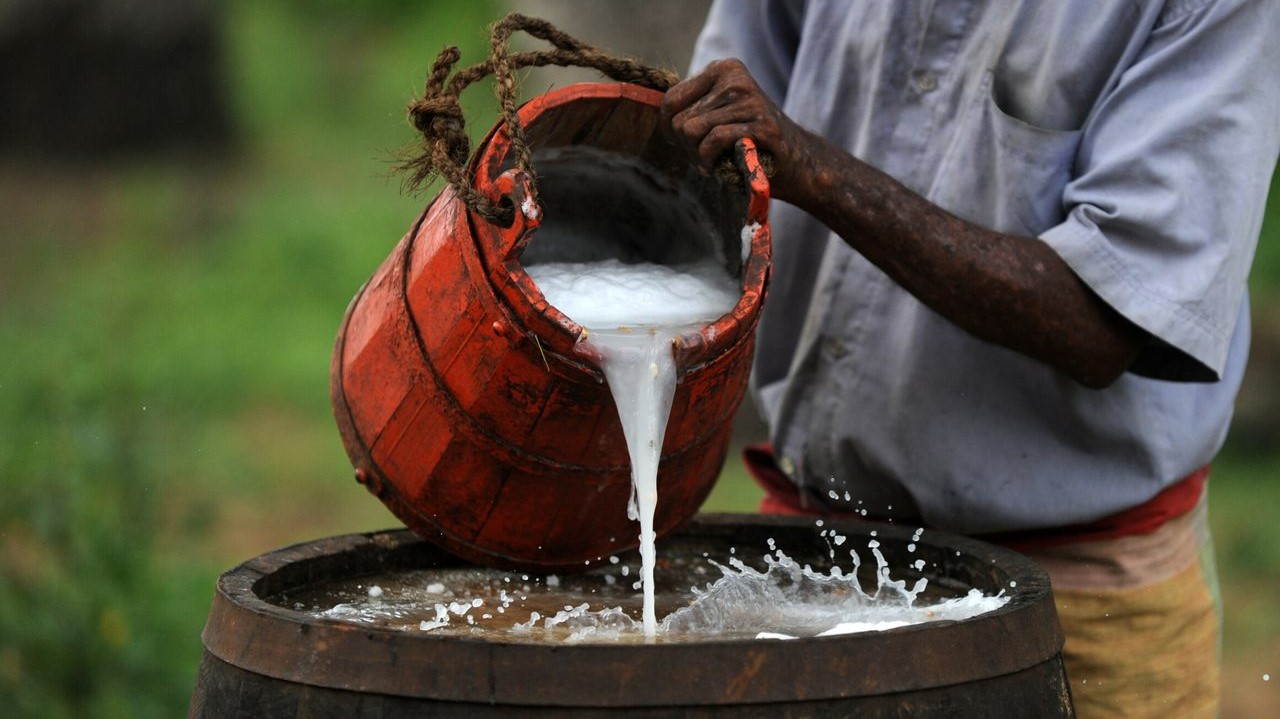
How Palm Wine Is Made: From Tree to Cup
Share
Palm wine, also known as “emu” (Yoruba), “ngwo” (Igbo), or “palm toddy”, is more than just a drink—it’s a cultural symbol across West and Central Africa. Shared during weddings, festivals, or simply enjoyed at the end of a long day, palm wine carries heritage, flavor, and plenty of curiosity.

Image from: Mellon Diversifying the Field
But beyond the nostalgia, many people today are asking:
- How healthy is palm wine?
- Does palm wine spike sugar levels?
- What is the alcohol content in palm wine?
- Is it sweet or sour?
- Is palm wine good for the heart or kidneys?
- And where can I find palm wine near me in Chicago or anywhere in the USA?
Let’s dive in.
Also read: Where to Find Funbact A Triple Action Cream In the USA and How to Use It
The Process: How Palm Wine Is Made
Palm wine is tapped from different species of palm trees—like the oil palm, date palm, or raffia palm. The process is as natural as it gets:
1. Tapping the Tree: Farmers carefully cut into the palm tree’s flower or trunk to collect sap.

Image from: Daily Post Nigeria
2. Fermentation: The sap begins fermenting almost immediately after tapping due to natural yeasts in the air.

Image from: Dreamstime.com
3. Fresh Palm Wine: Within the first few hours, it’s sweet, milky, and slightly fizzy—almost like a natural soda.

Image from: Dreamstime.com
4. Fermented Palm Wine: After 24+ hours, the drink becomes more sour, acidic, and develops a stronger alcohol content.

Image from: L'afrique Market
This dual nature—sweet at first, sour with time—is what makes palm wine so unique.
How Healthy is Palm Wine?

Image from: Boomplay Music
Palm wine contains:
- Vitamin C (good for immunity)
- Amino acids and proteins (support body function)
- Probiotics (from natural fermentation, aiding digestion)
- Antioxidants (linked to improved heart health)
However, moderation is key. Because it ferments quickly, palm wine can become highly alcoholic if stored too long.
Does Palm Wine Spike Sugar Levels?
Freshly tapped palm wine is naturally sweet because of the sugars in the sap. This means:
- For diabetics, drinking large amounts of fresh palm wine could temporarily raise blood sugar.
- After fermentation, the sugar reduces, but alcohol increases.
So, while it doesn’t spike sugar as sharply as soda, it still requires caution for anyone monitoring glucose.
What is the Alcohol Content in Palm Wine?
Palm wine’s alcohol content depends on fermentation time:
- Freshly tapped: Less than 2%
- After 24 hours: 3–6%
- Longer fermentation: Up to 12%
That’s why in villages, people rush to drink it fresh—it’s lighter, tastier, and safer.
Is Palm Wine Sweet or Sour?
Both.
- Fresh: Sweet, slightly fizzy, refreshing.
- After a day or two: Sour, tangy, more alcoholic.
It’s almost like comparing fresh juice to kombucha.
Is Palm Wine Good for the Heart and Kidney?
- Heart: Palm wine in moderation has been linked to improved circulation and antioxidant benefits. But overconsumption—because of alcohol—can strain the heart.
- Kidneys: Moderate consumption may help with hydration and provide electrolytes, but too much (especially fermented wine) can stress the kidneys.
Bottom line: As with all drinks, moderation matters.
Myths vs Facts About Palm Wine

Image from: Medium
Myth 1: Palm wine is always alcoholic.
Fact: Fresh palm wine is very low in alcohol; it ferments over time.
Myth 2: Palm wine can “cure” all diseases.
Fact: Palm wine has nutrients, but it’s not a miracle cure.
Myth 3: Palm wine is only for elders in the village.
Fact: Palm wine is enjoyed by young and old, and it’s making a comeback in global markets.
Where Can I Find Palm Wine Near Me in Chicago or the USA?
Traditionally, palm wine was only available in African villages—but thanks to specialty stores, you can now enjoy authentic bottled palm wine abroad.
If you’re in Chicago or anywhere in the USA, the best place to find palm wine is right at L’Afrique Market. We bring the authentic taste of Africa closer to you—freshly bottled, ready for your next cookout, family gathering, or a chilled evening at home.
Browse palm wine and other African drinks here: L’Afrique Market Drinks
Rounding Up
Palm wine isn’t just a drink—it’s culture, health, and community in a cup. Sweet when fresh, stronger as it ferments, and always central to African gatherings.
So the next time you’re hosting a backyard grill, serving jollof rice, suya, or grilled chicken, don’t forget the palm wine on the table.
And if you’re in the US, wondering where to get it? L’Afrique Market has you covered.
